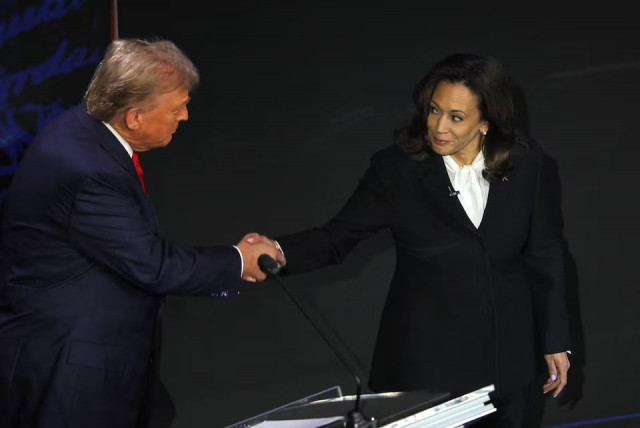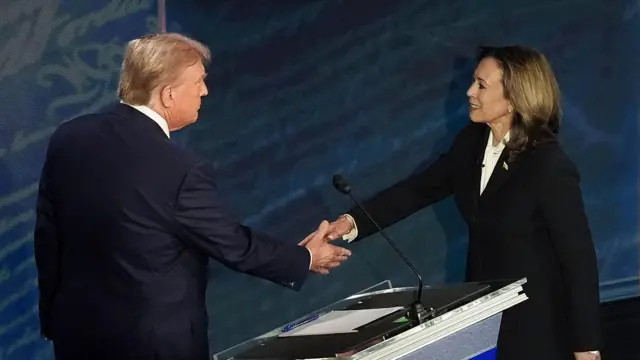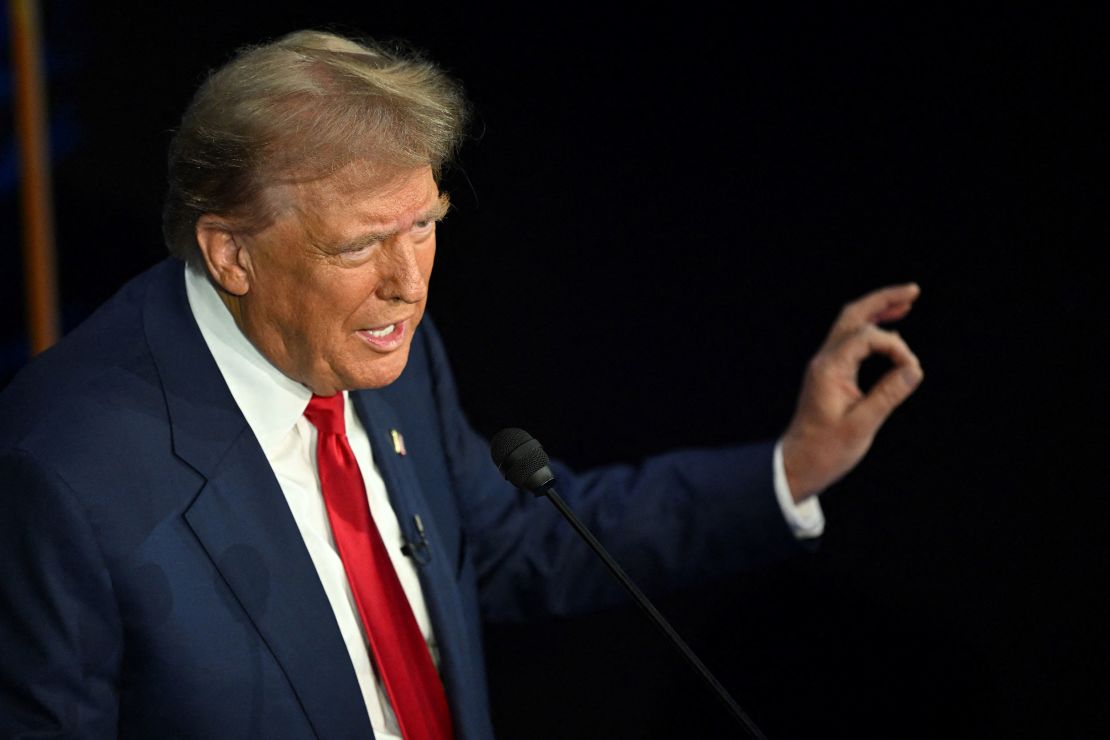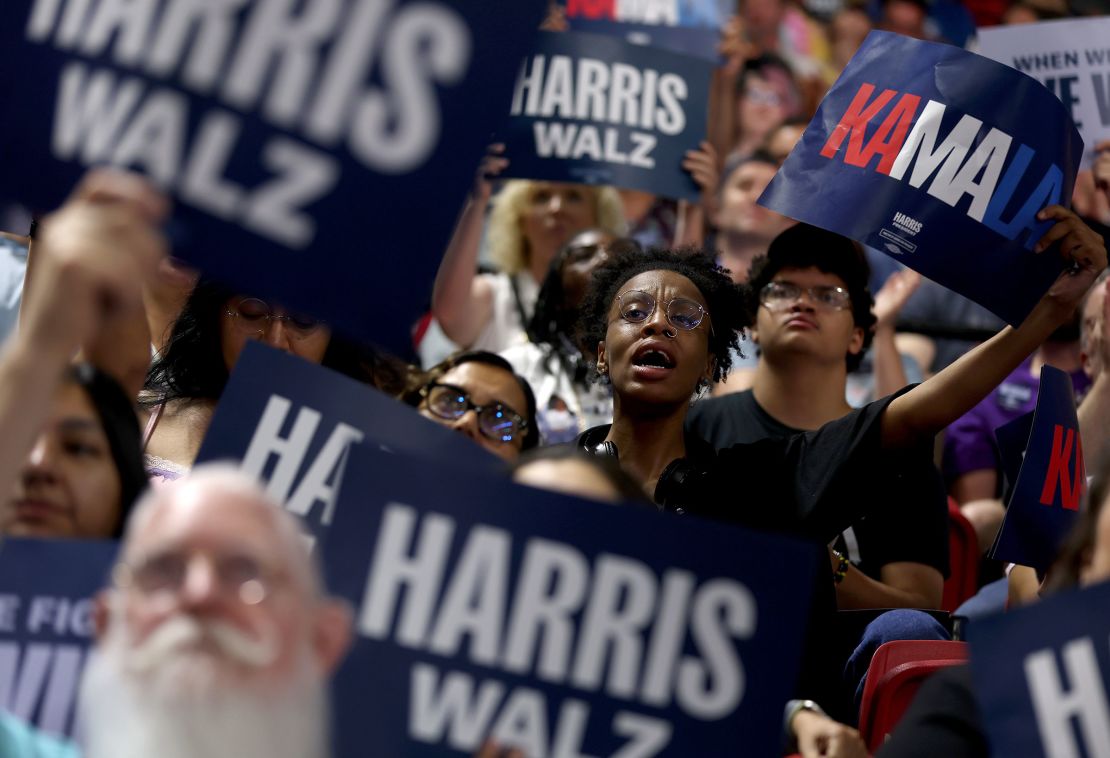US election: Harris rattles Trump in fiery debate as both push for mantle of change
Harris criticised Trump’s legal woes, foreign policy, mostly on Ukraine, while Trump attacked her position on Israel

In their first presidential debate for the 2024 US election on Tuesday, Republican Donald Trump and Democratic Vice President Kamala Harris clashed on key issues such as abortion, the economy, immigration, and Trump's legal problems.
Both candidates aimed for a pivotal moment in their closely contested race, with each seeking to sway undecided voters in what is set to be a high-stakes election.

Harris, leveraging her background as a former prosecutor, launched a series of sharp criticisms against Trump.
She targeted his stance on abortion, his fitness for office, and his numerous legal challenges, including a criminal conviction related to hush money payments and various other indictments.
Trump, who denied any wrongdoing, responded with a series of defensive remarks, claiming without evidence that these cases were orchestrated by Democrats.
He also repeated his unfounded claim that the 2020 election was stolen from him.
At one point in the debate, Harris mocked Trump’s campaign rallies, suggesting that attendees leave early out of boredom. This comment appeared to irritate Trump, who countered by boasting about the size of his rallies and pivoting to an unsubstantiated conspiracy theory about Haitian immigrants in Ohio. Harris dismissed this claim with laughter, branding it extreme.

On the topic of abortion, Harris was particularly vocal, speaking passionately about the consequences of recent statewide bans following the Supreme Court's 2022 decision to overturn the nationwide right to abortion.
She warned that Trump would support a national ban, a claim he denied.
Trump, meanwhile, accused Harris and the Democrats of supporting infanticide, a false claim that moderator Linsey Davis pointed out was illegal in every state. Harris responded by dismissing Trump’s remarks as “a bunch of lies.”
Trump also faced scrutiny over his ties to Project 2025, a conservative policy plan aimed at expanding executive power and curbing environmental regulations.
Harris sought to link Trump to the project, accusing him of supporting its more radical proposals, such as restricting access to abortion pills. Trump distanced himself from the blueprint, although some of his advisers were involved in its creation.

On the economy, an issue that has historically favoured Trump according to opinion polls, the two candidates offered competing visions.
Harris criticised Trump's plan to impose high tariffs on foreign goods, likening it to a tax on the middle class, and promoted her own proposals for tax benefits targeting families and small businesses.
She further condemned Trump’s handling of the economy during his presidency, particularly during the Covid-19 pandemic when unemployment spiked.
Trump, in turn, criticised the inflation levels under the Biden administration, though he exaggerated the impact. He also reverted to his key campaign theme of immigration, repeating unfounded claims of increased crime caused by migrants crossing the southern US border.
The candidates also touched on foreign policy, particularly the ongoing conflicts in Israel and Ukraine. Harris accused Trump of being willing to abandon US support for Ukraine in favour of Russian President Vladimir Putin, a claim Trump vehemently denied.
Trump countered by alleging that Harris “hates Israel,” which she firmly rejected.
This debate, the only one scheduled between the two candidates, occurred with just eight weeks left before the 5 November election and only days before early voting begins in several states.
With a televised audience of millions watching, both candidates faced risks and opportunities as they sought to energise their base and sway undecided voters.
For Harris, the debate held particular significance. Having entered the race only seven weeks ago following President Joe Biden’s exit, she needed to introduce herself to voters who, according to polls, still felt they did not know much about her. Her performance, particularly her attacks on Trump, sought to energise her supporters and draw a contrast between her vision and Trump’s policies.
Trump, who has been the subject of multiple legal cases and investigations, faced pressure to maintain his base while reaching out to undecided voters. His campaign strategy, which has included personal attacks on Harris, was tempered in the debate's early stages, but he became more agitated as the evening progressed.
He avoided some of his usual insults but referred to Harris as a "Marxist" at one point, a label that drew an amused response from Harris.
Tight race in key swing states
The debate concluded with both candidates locked in a tight race. Opinion polls indicated that the contest could come down to a small number of votes in key battleground states, meaning any shift in public opinion could prove decisive.
Polling averages compiled by The New York Times show the candidates are effectively tied in seven swing states, highlighting the razor-thin margin separating them.
The debate was held at the National Constitution Center in Philadelphia and hosted by ABC News. In line with the campaigns' agreement, there was no live audience, and the candidates’ microphones were muted when it was not their turn to speak.
Although presidential debates do not always drastically alter the trajectory of an election, they can influence public perceptions and change the dynamics of a race.
For both Trump and Harris, the stakes were high as they sought to present themselves as the best choice to lead the country in the years ahead. With early voting imminent, the debate marked a crucial moment in the campaign, setting the tone for the final weeks leading up to Election Day.
The first – and potentially, only – presidential debate between Donald Trump and Kamala Harris is over. It was an action-packed 90 minutes that could have the potential to impact the election. Here’s what you need to know.



















COMMENTS
Comments are moderated and generally will be posted if they are on-topic and not abusive.
For more information, please see our Comments FAQ